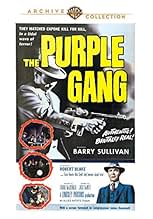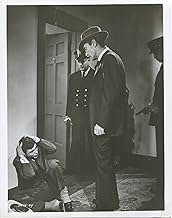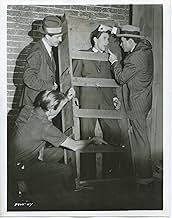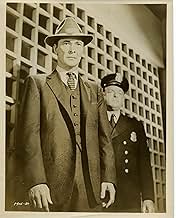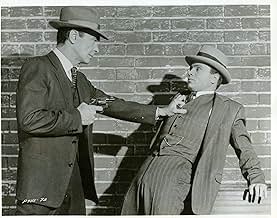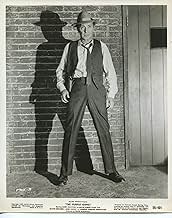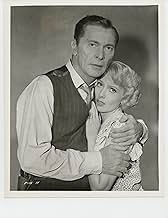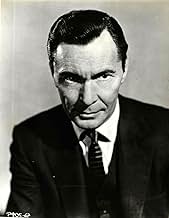The story of the infamous Purple Gang, a ring of bootleggers, hijackers and killers in 1920s' Detroit.The story of the infamous Purple Gang, a ring of bootleggers, hijackers and killers in 1920s' Detroit.The story of the infamous Purple Gang, a ring of bootleggers, hijackers and killers in 1920s' Detroit.
Suzanne Ridgway
- Daisy
- (as Suzy Marquette)
Joe Turkel
- Eddie Olsen
- (as Joseph Turkel)
James Roosevelt
- Self in Prologue
- (as Congressman James Roosevelt)
Benjie Bancroft
- Police Officer
- (uncredited)
- Director
- Writer
- All cast & crew
- Production, box office & more at IMDbPro
Featured reviews
The Purple Gang was a mob of bootleggers and hijackers with predominantly Jewish members operating in Detroit, Michigan, during the 1920s. They came to be Detroit's dominant criminal gang, but ultimately excessive violence and infighting caused the gang to self-destruct in the 1930s. This Allied Artists production, leveraged by a goodly amount of footage lifted from earlier films, plays fast and loose with what was an interesting history in a production weighted by two excellent leads, Sullivan and Blake, and which contains two or three memorably violent scenes while Blake's screaming claustrophobia offers other choice moments. Ultimately not one of the genre stand outs (for that one needs to seek out such titles as AL CAPONE or the RISE AND FALL OF LEGS DIAMOND etc) it is never the less a entertaining enough time waster even if it ends up feeling rather perfunctory. Sullivan's best gangster film, imho, is the appropriately named THE GANGSTER.
Robert Blake's portrayal of Honeyboy is chillingly charismatic. Honeyboy leads his gang of teenage hoodlums to success in the big leagues of organized crime. The key to Honeyboy's success and his dedication as a "leader" lies in the fact that he is a sociopathic killer and a psychopathic egomaniac. Robert Blake plays it all to the hilt and still manages to make Honeyboy cute and sympathetic.
Most of my 7/10 goes to two things - Robert Blake's effective portrayal of completely amoral, calculating, and mentally unbalanced baby-faced mobster Honeyboy Willard and to the rather detached documentary feel of this film as it is narrated by the cop that has vowed to put the Purple Gang away, Barry Sullivan as Lt. William P. Harley of the Detroit Police. It really has the look and feel of "The Untouchables" except with poverty row roots.
There really was a Purple Gang in Detroit in the 20's and 30's, although the character of Honeyboy is a fictional one - the actual power in the real gang was in the hands of four Jewish brothers. The cleaner and dyers war was a real one, except in real life the Purple Gang was allied with the union against non-union independents. There was no rather clean ending to the story of the Purples in real life. Like so many other gangs, Prohibition gave them money and power they could have only dreamed about, and its end sent them on a slow decline with the primary source of their wealth literally dried up.
This film is unusual in that there are no female leads or even substantial female supporting roles here. Women are just the subjects of particularly savage crimes by the Purples, and very little more, meant to underscore the violence of the Purple Gang.
If this film had been in wider release by a bigger studio, maybe Robert Blake wouldn't have had to wait until 1967 and "In Cold Blood" to catapult to stardom. Here he steals the show, kills everyone else, and gives a truly riveting performance of a guy who really loves his work for reasons that seem to have more to do with a need for power and a desire to be feared than just pure greed. Don't believe the low rating on this one - give it a try realizing it is a B feature from a small studio made just as the production code was losing its grip.
There really was a Purple Gang in Detroit in the 20's and 30's, although the character of Honeyboy is a fictional one - the actual power in the real gang was in the hands of four Jewish brothers. The cleaner and dyers war was a real one, except in real life the Purple Gang was allied with the union against non-union independents. There was no rather clean ending to the story of the Purples in real life. Like so many other gangs, Prohibition gave them money and power they could have only dreamed about, and its end sent them on a slow decline with the primary source of their wealth literally dried up.
This film is unusual in that there are no female leads or even substantial female supporting roles here. Women are just the subjects of particularly savage crimes by the Purples, and very little more, meant to underscore the violence of the Purple Gang.
If this film had been in wider release by a bigger studio, maybe Robert Blake wouldn't have had to wait until 1967 and "In Cold Blood" to catapult to stardom. Here he steals the show, kills everyone else, and gives a truly riveting performance of a guy who really loves his work for reasons that seem to have more to do with a need for power and a desire to be feared than just pure greed. Don't believe the low rating on this one - give it a try realizing it is a B feature from a small studio made just as the production code was losing its grip.
Policeman Barry Sullivan fights Detroit's Purple Gang led by Robert Blake in the 1920s and 1930s in this Allied Artists programmer directed by Frank MacDonald. Quite obviously shot on studio lots and underdecorated sets, with a lot of stock footage edited into montages, it also features a high-speed narrative voice-over narrative by Sullivan.
The Purple Gang was a real Detroit mob, perhaps best remembered for being predominantly Jewish. The movie makes no indication of this.
Suzanne Ridgeway has a small part in this movie. She had entered the movies in 1937. Ultimately, she appeared in 233 feature films, 12 shorts and 13 television appearances. In that time, she was received on-screen credit four times, including the infamous FROM HELL IT CAME. This was her last movie appearance. She died in 1996, 78 years old, another of the forgotten horde of players whose presence helped make two Oscar winners and a multitude of other movies.
The Purple Gang was a real Detroit mob, perhaps best remembered for being predominantly Jewish. The movie makes no indication of this.
Suzanne Ridgeway has a small part in this movie. She had entered the movies in 1937. Ultimately, she appeared in 233 feature films, 12 shorts and 13 television appearances. In that time, she was received on-screen credit four times, including the infamous FROM HELL IT CAME. This was her last movie appearance. She died in 1996, 78 years old, another of the forgotten horde of players whose presence helped make two Oscar winners and a multitude of other movies.
As I have already told many many times in my reviews, the early sixties in Hollywood was the era where gangsters period crime biopics were gallore, more or less inspired from actual facts though: PORTRAIT OF A MOBSTER, PAY OR DIE, MURDER INC, RISE AND FALL OF LEGS DIAMOND, KING OF THE ROARING 20'S, BABY FACE NELSON, YOUNG DILLIGER, AL CAPONE, MAD DOG CALL. Only "mature" Dillinger's character was missing between a 1945 and 1973 movie !!!! This one is not the least in terms of quality, yes, 1961 was the year of this kind of gangster tales, maybe the TV series THE UNTOUCHABLES influenced this period. I am dead sure of it. Robert Blake as here as John Davis Chandler was in MAD DOG CALL; purely terrific as a cold blooded killer. It begins like a DEAD END KIDS flick but the pace rapidly changes. Frank Mac Donald's best film for me, because he was rather a lousy director. Mostly B westerns for B companies.
Did you know
- TriviaThe real Purple Gang was made up of mostly Jewish members. The script of this film gave the members non-Jewish names. It was the dominate criminal organization in Detroit from about 1927 until 1932 when the gang self-destructed - with help from the Italian mob.
- Quotes
William Joseph 'Honeyboy' Willard: [instructing some henchmen before setting up a deal] No liquor, no junk and no broads when I'm runnin' the show.
- Crazy credits[Prologue] This picture is based on information from official files which revealed the shocking story of the wave of juvenile delinquency which spawned Detroit's Purple Gang. Incredible as it may seem, this youthful rat-pack of terrorists dominated the city's underworld for more than a decade during the prohibition era.
Details
- Runtime1 hour 25 minutes
- Color
- Aspect ratio
- 1.85 : 1
Contribute to this page
Suggest an edit or add missing content

